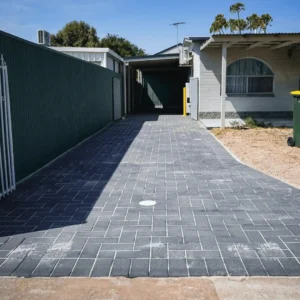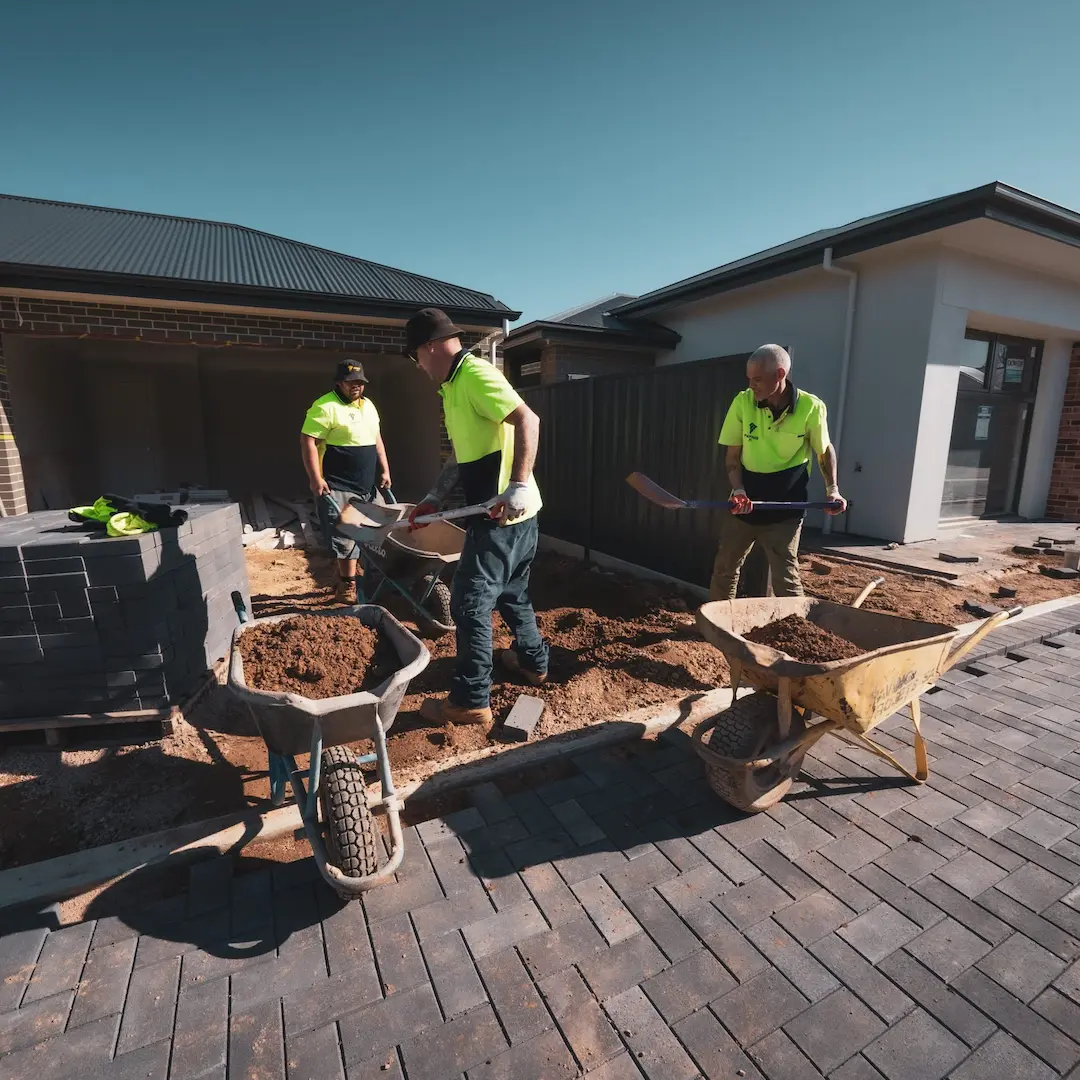Paving stones have been a favoured choice of both homeowners and professionals for centuries due to their durability, attractiveness, and versatility. Used for outdoor renovation projects such as landscaping or walkways, these materials can be installed in various ways while providing stunning visual appeal. In this blog post, we will take an in depth look at the characteristics of paving stone so that you may make informed decisions about your project design needs!
Short Summary
-
- Paving stones are durable, adaptable materials used to create aesthetically pleasing surfaces for pathways, patios and driveways.
-
- They come in a range of colours, textures and shapes with various laying patterns providing flexibility in design.
-
- Paving stones offer excellent longevity and versatility but have higher initial costs compared to other materials.
Understanding Paving Stones
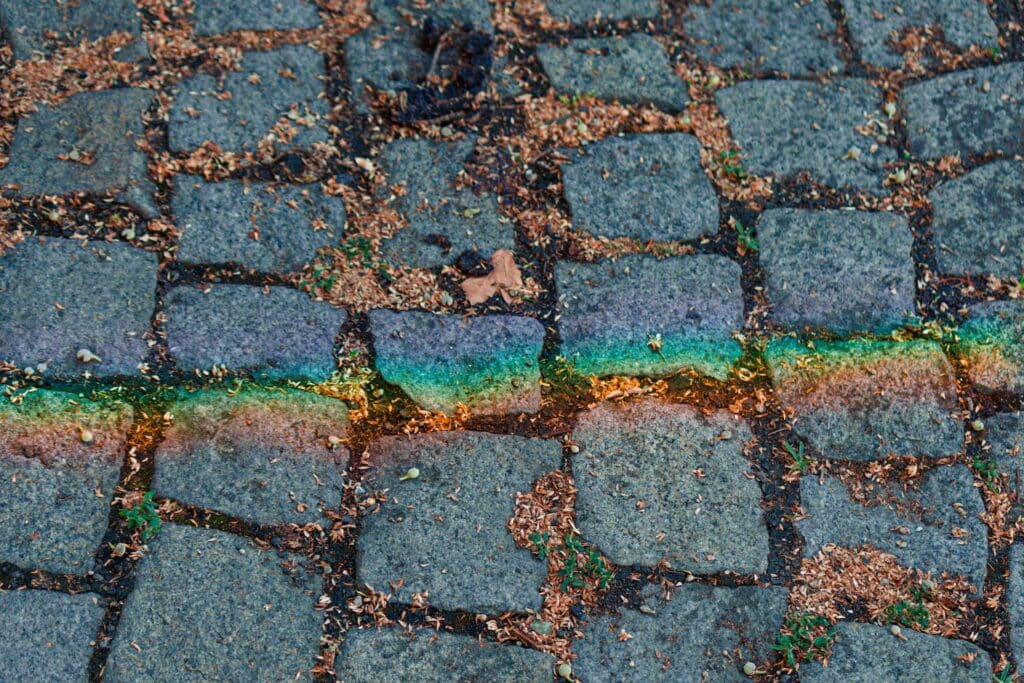
Paving stones are materials that can be made from natural, manufactured or even brick-like components constructed of concrete. Due to their toughness and aesthetic value, they are extensively used for constructing flat surfaces such as pathways, driveways and patios with beauty and durability in mind. Natural stone pavers along with options like concrete pavers and brick pavers offer a versatile range available for any particular application while creating visually appealing results. Stone paving is essential when it comes to assembling pool decks – thanks to the strength of its elements combined with the impressive looks generated by these natural/manufactured items plus bricks respectively. A paving contractor is generally responsible for the installation of a paved surface, whether its a driveway or outdoor patio.
Characteristics of Paving Stones
Paving stones are available in a range of natural materials, all with their own special qualities. Cobblestone pavers stand out for both how durable they are and also due to their attractive look. Limestone paving slabs offer great durability combined with aesthetic beauty as well as the composition of silicon and lime particles.
Slate is another type of stone that can be used since it’s made up of many layers formed by earth’s crust compressing minerals together, making its properties suitable for certain uses like pavement construction purposes.
Though these particular types of stones usually display outstanding strength along with an eye-catching appearance while proving simple to maintain, you should expect them to come at somewhat significant cost if you choose this option when building or renovating your space.
Common Uses of Paving Stones
Paving stones are perfect for both outdoor design projects and high-traffic areas. Thanks to their durability, resistance to wear and tear, as well as great aesthetic appeal, these materials can be used in numerous settings including driveways, walkways, patios, pool decks. They even make good walls or benches when needed!
Creative solutions utilising paving stones have become increasingly popular since the range of options this material offers is near limitless – pathways winding through gardens or patterns around pool sides could all benefit from being laid out with quality paving stone laying craftsmanship.
Plus you don’t need to worry about replacing them quickly due to heavy foot traffic either – a real advantage given how long lasting it usually turns out that such installations end up proving themselves over time!
Types of Paving Stones
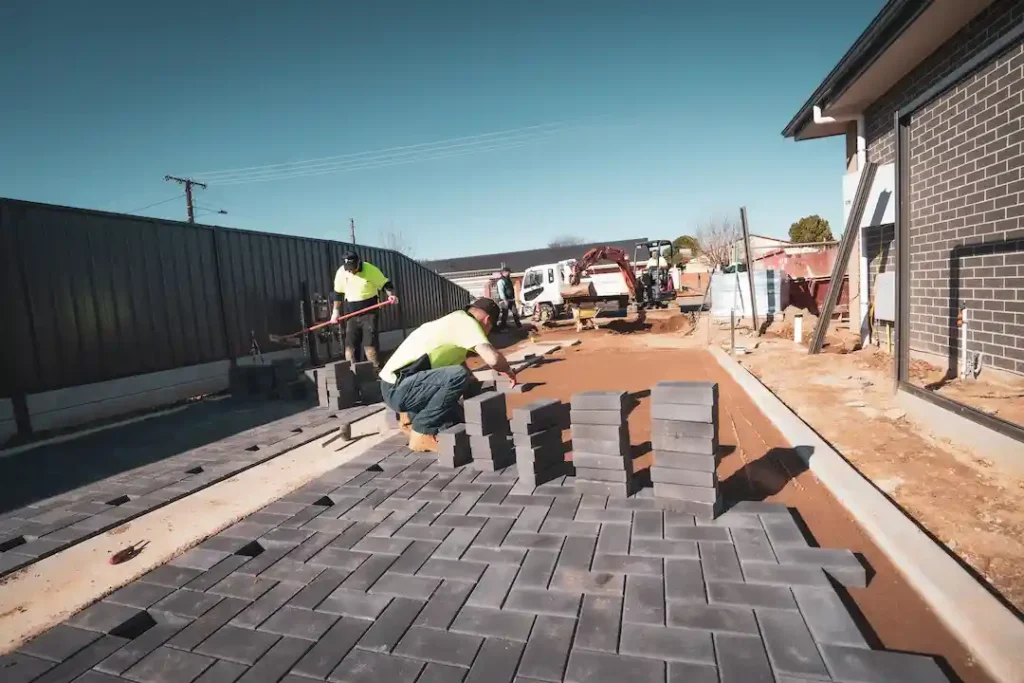
When it comes to paving, there are three primary types of pavers one can pick from: natural stone, concrete and brick. All these stones comprise distinct materials including rubber, marble travertine, plastic plus many more for instance flagstone or porcelain.
For some people, opting for authentic alternatives such as the real stone is a better option than going with artificial items. Others may prefer how natural material looks like in comparison. Concrete pavers prices rank low compared to other options like bricks before reaching out to costlier than those two, natural stone being the most expensive type among them all.
Natural Stone Pavers
Pavers crafted from natural stone, such as sandstone, limestone and granite, offer a unique aesthetic with varying textures and hues. Granite is typically the primary material used for producing pavers. Basalt, limestone or sandstone may also be part of the composition. For instance, marble offers an attractive tumbled finish that’s popular among many homeowners these days when it comes to paving projects due to its durability and abundance in availability – Indian Sandstone Paving Slabs are renowned across numerous circles for their plentiful colours choices plus long lasting properties which can improve any building project involving pavers constructed out of genuine stones like this one!
Concrete Pavers
Concrete pavers provide a cost-effective and varied solution, with many designs and colours available. They are made by combining concrete with a colouring agent in the mould of the desired shape before pouring it out to set. This leads to sturdy hardscape products suitable for different purposes such as driveways, patios, walkways, garden sheds or pool decks around your home. To get even more color options try tinting them using dyes and pigments. Polymeric sand can be used too so that their durability is increased significantly while they withstand extreme weather conditions perfectly well under constant weight from heavy loads without any issues at all.
Brick Pavers
Brick pavers are made out of clay and give off a timeless look with immense durability, maintaining its color for long periods. They usually serve as the base for patios, driveways or garden pathways. Providing firmness as well as eye-catching visuals on the surface.
These brick pavers are hardy against heavy use which makes them an ideal option if you desire to utilize this classic design in places where they’re prone to high traffic levels.
Paver Design Options
Pavers are a great way to customise the look of your outdoor space. With an array of colours, textures, sizes and shapes available – as well as creative laying patterns like herringbone or basket weave – you can make anything from classic cobblestone designs to modern geometric patterns. Choose between smooth surfaces for a sleek aesthetic, or go with textured options that add visual interest. No matter what style you prefer, there’s sure to be the perfect paver solution for any project!
Colors & Textures
Paving stones come in a plethora of colours, from pink to bronze. The texture may differ greatly. They can be either smooth or rough with textured finishes for a unique and visually appealing look when used as pavers. Concrete is often the type of stone chosen due to its durability, but other materials like brick and natural stone are also utilised depending on individual taste preferences. These various options allow one to create an aesthetically pleasing design that complements their home’s style with paving stones tailored just right for them!
Shapes & Sizes
Paving stones come in various shapes, sizes and thickness, ranging from 3×6 inches to 6×9 inches. This provides designers with the flexibility they need when it comes to creating intricate patterns using these pieces of stone for paving purposes. Mixing different types such as square, rectangular, hexagonal or octagonal can bring out an appealing look that also meets specific requirements simultaneously. Colours and textures are available too, which makes them even more eye-catching, adding greater vibrancy overall!
Laying Patterns
Pavers can be laid in a multitude of ways to provide an attractive and sturdy base for outdoor surfaces. Popular laying patterns include stack bond, basketweave, running bond and herringbone, these offer diverse styles that enable designers to create unique visuals with the added bonus of strength underneath. Homeowners should explore different options if they want their paved area not just to be functional, but also visually pleasing as well.
Paver Installation & Maintenance
To keep their beauty and durability, paver maintenance is key in guaranteeing the success of a paver installation. If executed correctly, this will result in an appealing surface which can greatly increase the appeal of any outdoor area while adding value to it as well through paving stones.
Installation Process
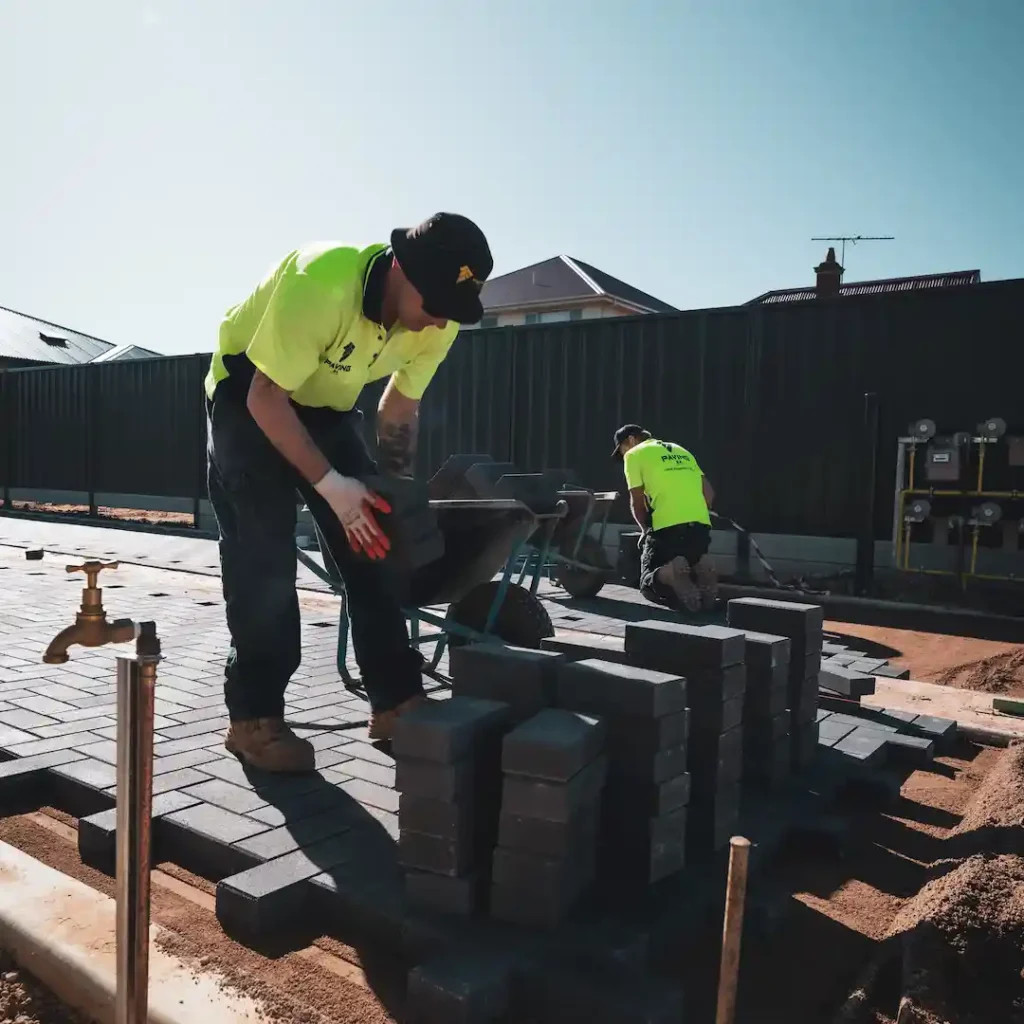
In order to achieve a strong and long-lasting surface, paver installation needs to be carried out correctly. To begin the process, grass and soil must be removed from the area before laying down a solid base for paving stones with sand. This is then followed by placing pavers in their designated pattern, secure each stone firmly using either rubber mallet or hand tamper before sweeping sand into joints between them for increased stability of entire paved surface.
Maintenance Tips
The maintenance of paving stones is minimal, with an occasional clean and seal to maintain its look and durability. To keep them in good condition, you can utilise either a pressure washer or simply a garden hose to take away dirt as well as debris from the exterior surface. A sealant for the paving will help secure it against wear and tear while also preserving its charming appearance.
To guarantee their life span, harsh chemicals should be avoided at all times along with any kind of abrasive materials that could possibly harm their surface area.
Comparing Paving Stones to Other Materials
When it comes to paving options for your outdoor area, you need to consider the benefits and drawbacks of using stones versus other materials like concrete slabs. Although they may be more costly than conventional ones, paved stones have a greater level of longevity and are an investment that is worthwhile in many situations. Paving with these types of materials can also give your space a unique style or feel depending on what type of stone has been chosen, from natural rock surfaces all the way through marble sets! Ultimately, while deciding which material works best for you, it’s important weigh up its costs against any potential advantages.
Advantages of Paving Stones
Paving stones have a plethora of advantages due to their durability, flexibility and eye-catching design. The long life span they offer is mainly down to the combination of natural stone, brick or concrete which are used for their construction.
Not limited to driveways alone. Paving has many uses such as patios, walkways, and an extensive selection of sizes, textures and colours giving much scope in terms of materials for future development projects.
Drawbacks of Paving Stones
Paving stones can involve a more intricate installation procedure than other materials, like concrete, and may come with higher initial expenses. Installation of paving requires special tools and techniques that take extra time to set up compared to placing down concrete slabs. These unique items typically cost more money. To the actual paving stones themselves being expensive when taking into consideration all building material options available.
Summary
Paving stones are an incredibly versatile and eye-catching option for creating stunning outdoor spaces. With a vast selection of colours, textures, patterns, shapes and sizes available as well as their exceptionally durable quality compared to other materials make them quite desirable for those looking into landscape or outdoor renovations, there is simply no limitation on the design possibilities paving can offer you! So if it’s beauty coupled with long lasting capability that’s desired in your project plan then opting for these trusty paving stones should be something definitely considered. If you’re looking for paving services in any part of South Australia, our Adelaide based paving team can work with you to create a customised design that meets your needs and complements your home’s style!
Frequently Asked Questions
What is the definition of paving stone?
Paving stones are flat, typically square-shaped pieces of stone or brick used to create a durable surface for outdoor use. They offer an effective way to cover spaces with hard materials like these types of paving stones.
What are paving stones used for?
Paving stones are a popular construction material that can be used to make sturdy driveways, pathways and patios as well as pool decks. The materials used for paving usually consist of stone, brick or concrete, which ensures longevity when taken care of properly. Installing these pavers is easy since it allows you to create numerous patterns and designs in your outdoor space.
Paving stones have the advantage of being durable whilst providing an eye-catching addition due to their malleability, making them perfect for all kinds of residential projects requiring external flooring solutions!
What is paving stone made of?
Paving stones are typically composed of concrete, natural stone such as brick or porcelain and come in various colours, textures and patterns. The pieces vary greatly in size but all make up the same product: paving stones!
Are paving stones made of concrete?
Paving stones are constructed with concrete, formed into moulds of any given shape and then filled in with a special colouring agent. After allowing the mixture to set and harden, these paving stones can be cut to size as needed for installation purposes. The different colours present on each stone create an interesting aesthetic effect that compliments other outdoor structures or landscaping features such as decks or pathways.
What is the difference between natural stone, concrete, and brick pavers?
Pavers crafted from materials like sandstone, granite and limestone are termed natural stone pavers. On the other hand, concrete pavers made of concrete mixed with colorants are a cheaper alternative which is also simpler to lay down. Clay based brick pavers permit creation of complicated designs at a reasonable cost too.
In terms of attributes, it can be said that natural stone pavers’ endurance in extreme weather conditions makes them hardy while ceramic tiles pavements are more affordable & easily installable features make them desirable for varied applications. As far as brick pawers go, they remain economical & capable to shape intricate patterns when necessary.


